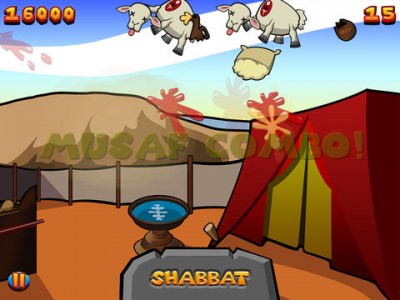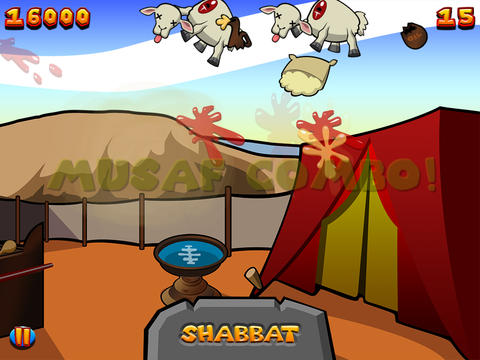
Last week, God’s Presence entered the Tabernacle, marking its completion as well as the end of the Book of Exodus. In this week’s portion, Vayikra, we open what could be considered the most difficult book of the Torah–Leviticus– with the teaching that the main purpose of the Tabernacle is as a place for sacrifices.
Right from the start, Leviticus shows no mercy, giving us exacting details on how to perform the sacrifices. If you are an animal lover, or have a weak stomach, you might want to skip this portion. I won’t go into those details here, but we have worship offerings, sin offerings, and peace offerings. God commands the people to offer up cattle, birds, and flour depending on the reason for the sacrifice and the wealth of the person bringing it. To our modern sensibilities, it can all seem pretty barbaric, and I think most of us can agree that the modern replacement of sacrifice with prayer is a good idea. Unless you’re the Temple Institute.
If you’re able to get through all the sacrifices, chances are you’re sitting there wondering why on earth God would command us to do all that. There is a lot to be said about the visceral experience of witnessing a life extinguish right before your eyes as blood splatters everywhere. It sounds terrible, but isn’t that why we enjoy violent media? There is also the idea that giving up one of your bulls or sheep is a major sacrifice, like giving a computer away once a year, they were sacrificing a major investment and important source of income and food to serve God. Finally, if we want to get historical, we can also say that this was the way everyone worshiped back then.
Rashi–the only rabbinic commentator that matters to a good portion of the Jewish world– and I agree that there has to be a little more to the sacrifices than an expensive visceral experience. Rashi spends a lot of time further elucidating the details necessary for sacrifice, but he also points out the spiritual meaning for a few of the sacrifices. It’s through Rashi we learn that, before God, the sacrifice of the poor, consisting of items of lesser quality, is considered equal if not greater than the sacrifice of the rich because it is not the physical sacrifice, but where the heart is directed, that matters.
Rashi also introduces a problem that leaves me with a further question: Why are the sacrifices for someone who’s accidentally sinned then found out about it different from the sacrifices for someone who is unsure whether they have sinned or not? Rashi answers that if someone performs the second sacrifice, then later discovers that they are indeed guilty, they are still obligated to perform the first sacrifice. If you’re absolved of guilt the first time around, why should it change when you find out you actually were wrong?
You know those times when you find yourself forced to apologize? Like maybe your parents are mad at you, or your friend just seems to be in a bad mood and you don’t know why, but you still have this sense that you did something wrong, so you apologize anyway? Or maybe you know why they are mad, but you don’t agree that you did something wrong, but for the sake of peace, you apologize anyway. We should apologize when we’ve upset someone, even if we don’t know how or why. If the apology is honest, it shows a personal desire for reconciliation. It tells them you care about the relationship. It is the same with our relationship with God, and thus we have sacrifices meant to ask for forgiveness even if we’re not 100% sure we were guilty.
But usually just saying sorry isn’t enough. Really making amends takes more, it takes a realization that you have done something wrong, and often requires actions that will correct the mistake. “I’m sorry I upset you”, is not as powerful as “I’m sorry that I said those hurtful words. It was wrong of me, and I hope you can forgive me.” This is that first type of sacrifice, an honest admittance of fault.
The sacrifice for the unknown sin is more expensive than the open one. Why is that? Because apologies are always difficult. Yet if we don’t believe that we’ve done something wrong, it is almost impossible for us to make ourselves apologize and even harder for that apology to seem sincere. Such an apology is less effective, yet requires more out of us. The other sacrifice/apology is not as difficult to deliver because we are fully aware that there is a need to apologize, making it easier for the other person to accept.
More importantly, the unknown sin sacrifice is more expensive because God wants to make its performance undesirable. This is to teach us to be more aware of how we act, to not only avoid mistakes, but to be aware of ourselves when we do make them.
If we go through our lives without consciousness, not only will we find ourselves erring unknowingly, but we will also be more likely to hurt others. We need to be aware of our behavior and how we treat others. This awareness will prevent us from harming others, and it will let us know when we have made mistakes so that we can learn from them and be able to make honest amends.
Have a great d’var Torah to share? Send it to editor@newvoices.org
David Gutbezahl is a student at Gratz College.

